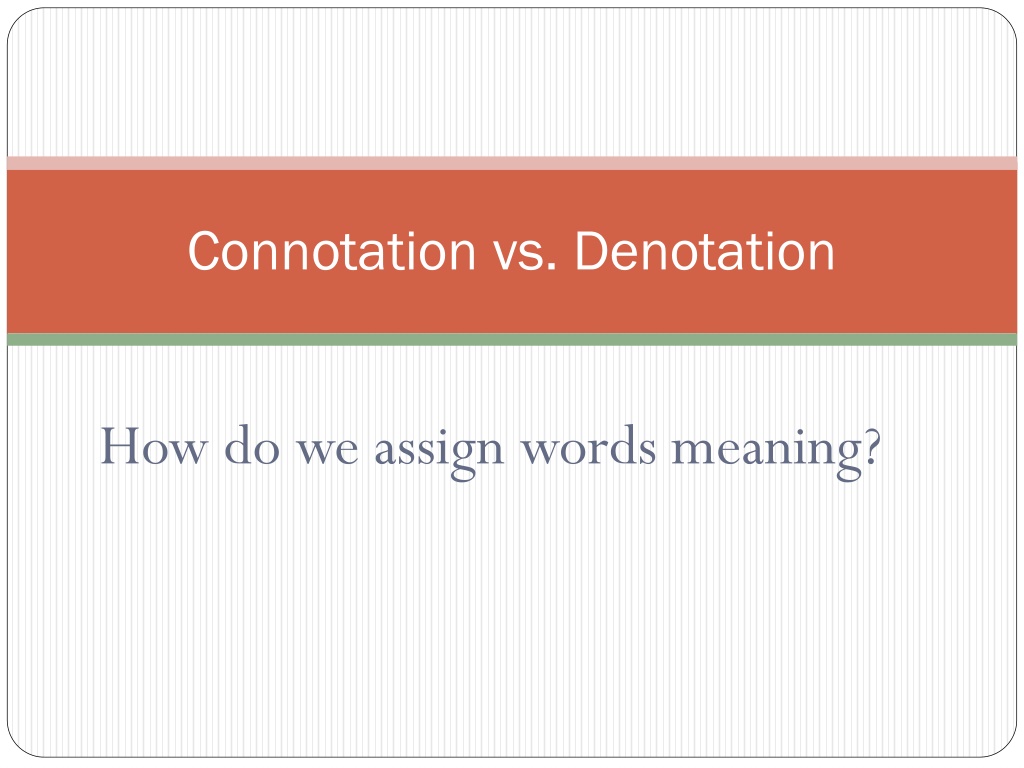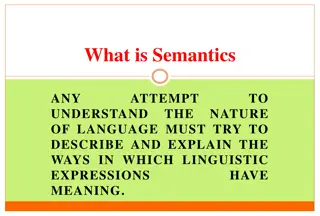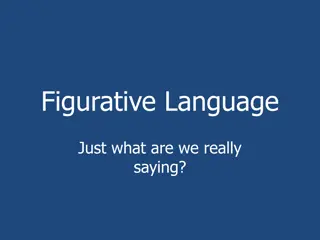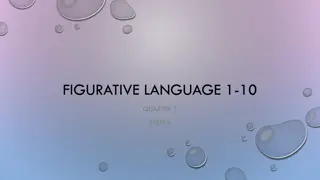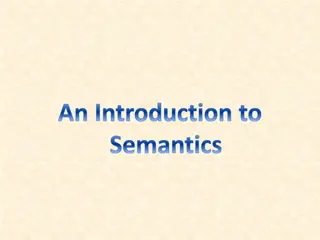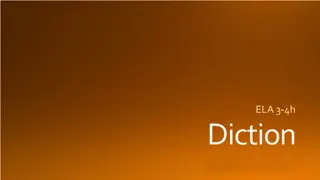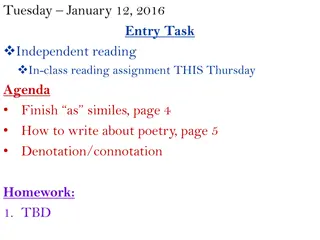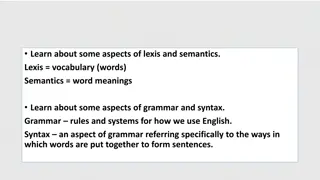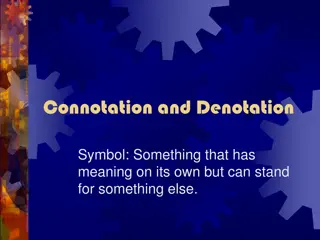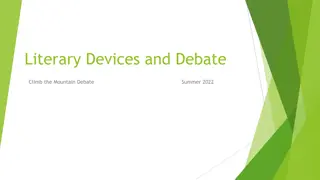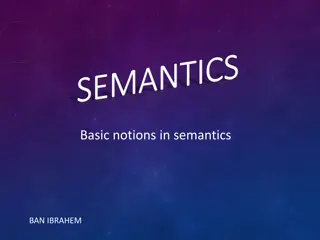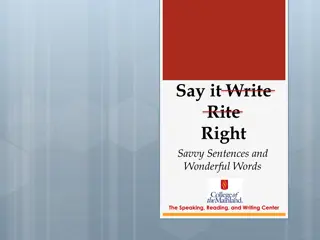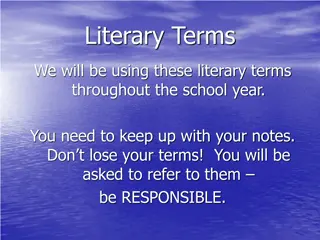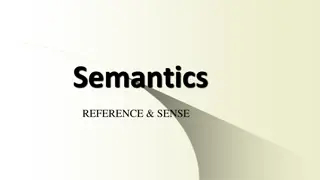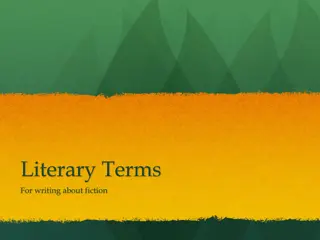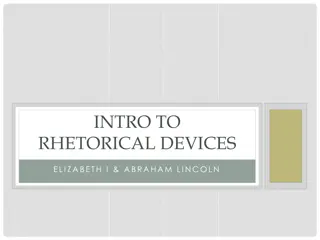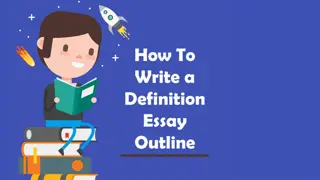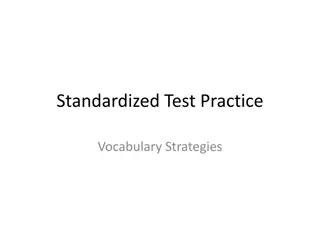Connotation and Denotation in Language
Connotation and denotation play crucial roles in assigning meaning to words. While denotation refers to the literal dictionary definition of a word, connotation involves the emotional and imaginative associations surrounding it. This distinction is exemplified through words like "house" and "home," where both have a similar denotation but carry different connotations. Exploring connotations enhances our understanding of language nuances and the richness of word associations beyond their literal meanings.
Download Presentation

Please find below an Image/Link to download the presentation.
The content on the website is provided AS IS for your information and personal use only. It may not be sold, licensed, or shared on other websites without obtaining consent from the author.If you encounter any issues during the download, it is possible that the publisher has removed the file from their server.
You are allowed to download the files provided on this website for personal or commercial use, subject to the condition that they are used lawfully. All files are the property of their respective owners.
The content on the website is provided AS IS for your information and personal use only. It may not be sold, licensed, or shared on other websites without obtaining consent from the author.
E N D
Presentation Transcript
Connotation vs. Denotation How do we assign words meaning?
SWBAT Define connotation and denotation Read a sentence and determine if the wording is connotative or denotative
Connotation and Denotation Connotation is the emotional and imaginative association surrounding a word. Denotation is the strict dictionary meaning of a word.
You may live in a house, but we live in You may live in a house, but we live in a home. a home. If you were to look up the words house and home in a dictionary, you would find that both words have approximately the same meaning- "a dwelling place." However, the speaker in the sentence above suggests that home has an additional meaning. home house
Connotation and denotation love Aside from the strict dictionary definition, or denotation, many people associate such things as comfort, love, security, or privacy with a home but do not necessarily make the same associations with a house. comfort security HOME privacy security
Questions to brainstorm. What is the first thing that comes to your mind when you think of: a home? of a house? Why do you think that real-estate advertisers use the word home more frequently than house?
Connotation feelings The various feelings, images, and memories that surround a word make up its connotation. Although both house and home have the same denotation, or dictionary meaning, home also has many connotations memories images Connotatio n
I know what you said, but what did you mean? I know what you said, but what did you mean? A word's denotation is its literal definition. For example: Snake: a limbless reptile with a long, scaly body A word's connotation is all the association we have with it. For example: "Snake in the grass," the biblical serpent, the danger of poisonous snakes, our own fear of snakes or a malevolent (evil, bad) person might be called "a real snake"
Who is hearing the word? Connotationcan depend on the person who hears the word and brings his or her own associations to it. * A plumber might immediately think of a plumbing tool called a snake. *A biologist might think of the rare Indigo Snake he felt lucky to see the past weekend.
Shades of meaning Some words, though, have shades of meaning that are commonly recognized. While "serpent" is literally a snake, the word "serpent" is usually associated with evil. In today's society, "politician" has somewhat negative associations, while "statesman" sounds more positive.
Use it in a sentence. You will answer ten questions while viewing the upcoming slides. Read the following sentences. Annette was surprised. Annette was amazed. Annette was astonished. 1. What is the general meaning of each of the three sentences about Annette? Do the words surprised, amazed, and astonished have approximately the same denotation?
Use it in a sentence. 2. What additional meanings are suggested by astonish? Would one be more likely to be surprised or astonished at seeing a ghost? I was surprised to see a ghost. I was amazed to see a ghost. I was astonished to see a ghost.
Compare some words. Write these examples in your daybook along with your answers 3. Which word in each pair below has the more favorable connotation to you? thrifty-penny-pinching pushy-aggressive politician-statesman chef-cook slender-skinny
Read it in text. Since everyone reacts emotionally to certain words, writers often deliberately select words that they think will influence your reactions and appeal to your emotions. Read the dictionary definition below. cock roach (kok' roch'), n. any of an order of nocturnal insects, usually brown with flattened oval bodies, some species of which are household pests inhabiting kitchens, areas around water pipes, etc. [Spanish cucaracha]
A cockroach? See what meanings poets Wild and Morley find in roaches in the following poems. 4. What does the word cockroach mean to you? 5. Is a cockroach merely an insect or is it also a household nuisance and a disgusting creature?
Roaches Last night when I got up to let the dog out I spied a cockroach in the bathroom crouched flat on the cool porcelain, delicate antennae probing the toothpaste cap and feasting himself on a gob of it in the bowl: I killed him with one unprofessional blow, scattering arms and legs and half his body in the sink... I would have no truck with roaches, crouched like lions in the ledges of sewers their black eyes in the darkness alert for tasty slime, breeding quickly and without design, laboring up drainpipes through filth to the light; I read once they are among the most antediluvian of creatures, surviving everything, and in more primitive times thrived to the size of your hand... yet when sinking asleep or craning at the stars, I can feel their light feet probing in my veins, their whiskers nibbling the insides of my toes; and neck arched, feel their patient scrambling up the dark tubes of my throat. ---Peter Wild
from Nursery Rhymes for the Tender-hearted Scuttle, scuttle, little roach- How you run when I approach: Up above the pantry shelf Hastening to secrete yourself. How delightful to suspect All the places you have trekked: Does your long antenna whisk its Gentle tip across the biscuits? Do you linger, little soul, Drowsing in our sugar bowl? Or, abandonment most utter, Shake a shimmy on the butter? Do you chant your simple tunes Swimming in the baby's prunes? Then, when dawn comes, do you slink Homeward to the kitchen sink? Timid roach, why be so shy? We are brothers, thou and I, In the midnight, like yourself, I explore the pantry shelf! Most adventurous of vermin, How I wish I could determine How you spend your hours of ease, Perhaps reclining on the cheese. Cook has gone, and all is dark- Then the kitchen is your park; In the garbage heap that she leaves Do you browse among the tea leaves? --Christopher Morley
Reading into the poems Reread the dictionary definition. cock roach (kok' roch'), n. any of an order of nocturnal insects, usually brown with flattened oval bodies, some species of which are household pests inhabiting kitchens, areas around water pipes, etc. 6. Which of the denotative characteristics of a cockroach do both poets include in the poems?
Reading into the poems 7. What characteristics does Wild give his roaches that are not in the dictionary definition? 8. What additional characteristics does Morley give to roaches?
Reading into the poems In each poem, the insect acquires meaning beyond its dictionary definition. Both poets lead us away from a literal view of roaches to a nonliteral one. 9. Which poet succeeds in giving roaches favorable connotations? 10. Which poet comes closer to expressing your own feelings about roaches?
More practice.. Directions: For these conditions, first think of a word with a positive connotation, and then think of a word with a negative connotation. Condition Positive Connotation Negative Connotation 1. Overweight 2. Short 3. Not smart 4. Unattractive 5. Non-athletic 6. Self-focused
